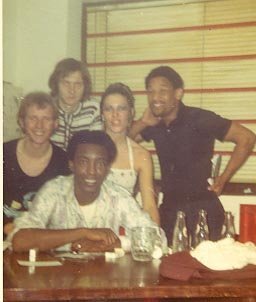
-
Caledoniasoul
Caledoniasoul moves to only its third permanent venue in 20+ years, taking over 18 Candleriggs, a superb club in Glasgow's vibrant Merchant City district. All the residents will be there plus special guest, Jordan Wilson. More to follow...
- Caledoniasoul (CANCELLED DUE TO LOSS OF VENUE)
- Caledoniasoul (CANCELLED DUE TO LOSS OF VENUE)
-
scotchmartin changed their profile photo
-
torch major lance's 1st appearance +judy moss doesn
Doing some research, can anyone tell me when Major Lance first appeared at The Torch, there's a pic here, wondering date? Approximately is fine, long time ago Thanks for a any help, Martin
-
Frankie & Johnny
Hello Gordy, I've PM'd you regarding your uncle. Best, Martin
-
CALEDONIASOUL
A night of 60's and 70s rare soul, newies and underplayed oldies aimed squarely at the dancefloor. Glasgow's famous Caledoniasoul ran originally from 2001 to 2006 at the Woodside Social Club, and brought the UK's top soul DJs to Scotland, some for the first time, including Ady Croesdell, Butch, Arthur Fenn, Guy Hennigan, Andy Dyson, Mick Smith, Ritson & Russell, Kenny Burrell, Ady Lupton, Marco Santucci, Alan & Steve Walls, Dave Rimmer, Jo Wallace, Kitch, Dean Anderson, Irish Greg, Keith Money and many, many more. The club returns for a new schedule of regular soul nights featuring special return appearances by some of the above guests, and new faces, from across the UK, plus residents. Admission is £6 on the door 8pm - 1am, £4 with student ID / unwaged. Special guests for February are Keith Whitson, Duce, Dale Dewsbury and residents Lenny and Martin. Record labels logo Graham Smith Design 2018 no unauthorised reproduction
-
Admirations (Merged Topic)
- Admirations (Merged Topic)
Can anyone clarify the matrix / run out on this please, I 'may' have an opportunity to aquire one - although not holding my breath - and it would be helpful to be very clear, is it different for the alternate pressings?- Admirations (Merged Topic)
Is there also a reverse colour ADMIRATIONS with PEACHES on left? So the dark pink is at the top / or bottom? The One John Manship had for sale recently had the dark pink at the bottom. John's copy obviously original, so is dark-pink-top just one variety of the original pressings? Anyone?- The Jokers (Harvey & The) Soul Sound Sko-Field
Thanks appreciate that. M- The Jokers (Harvey & The) Soul Sound Sko-Field
Please PM me if you would like to discuss selling an original copy of the Jokers on Sko-Field, any condition considered, price negotiable. Thank you.- June Alexander The Girl That Radiates That Charm Judd
Looking for an original copy of Sally Sue Brown b/w The Girl That Radiates That Charm by June Alexander on Judd. Please PM me if you have one for sale.- Current Bootleg Trading (split from Soul Pack thread)
It was pressed up by Stan Lewis at Bill's request to promote the band, "If you had a record, you got paid more and got more gigs" (Bill Bush). As far as I can gather although it's never been 100% clear and I don't think anyone could really recall, Stan did stock some in the shop he ran in Shreveport, and some sold, but it was primarily a promotional item (a business card, if you like) for Bill's combo, a very successful live group rather than recording artists. Velvet Touch is the a-side, a swamp-pop ballad that Bill was very proud of, it's a nice, well-crafted song to be fair but almost C&W. This would have been aimed at the white audience who attended tha cabarets, Riverboats and clubs in the area - or more specifically, the promoters / bookers of these venues.- Current Bootleg Trading (split from Soul Pack thread)
Just wanted to chip into this on 'Bill Bush' to set the record straight. In 2004 I tracked Bill down through the local paper, the rest is history and we became friends up to his untimely death in 2014. Over the years I sold several copies of his single I'm Waiting with profits going to Bill. He had at the time a very limited stock of his single which had been in the attic in the pressing plant box for 40 years, this was where the copies came from that I have sold. Anyone who has bought a copy of this single from Bill through me can be assured it is an original and from the artists own stock, and your details will remain confidential. Bill's copies do not have a RONN /Jewel/Paula sleeve as it was never properly released, but this has been added legitimately by major record retailers on a couple of occasions, and by me on one occasion as it was signed by Bill. On the original, the matrix reads, in this order anti-clockwise, TM2399 handwritten in the 3rd band of the run-out, then R-17 and SL-1311 - position varies on original copies. It is pressed onto vinyl and has a bevelled edge running down to the centre hole. It remains 'rare soul' in every sense and I'll do my best to keep it that way, for Bill. I hope that helps to address some concerns about this record - a copy will be auctioned on eBay starting Monday 4 April 2016 to assist with school trip to Europe for his grandson.- News: Bill Bush RIP.
Just saw this, yes it's a swamp pop ballad. - Admirations (Merged Topic)




